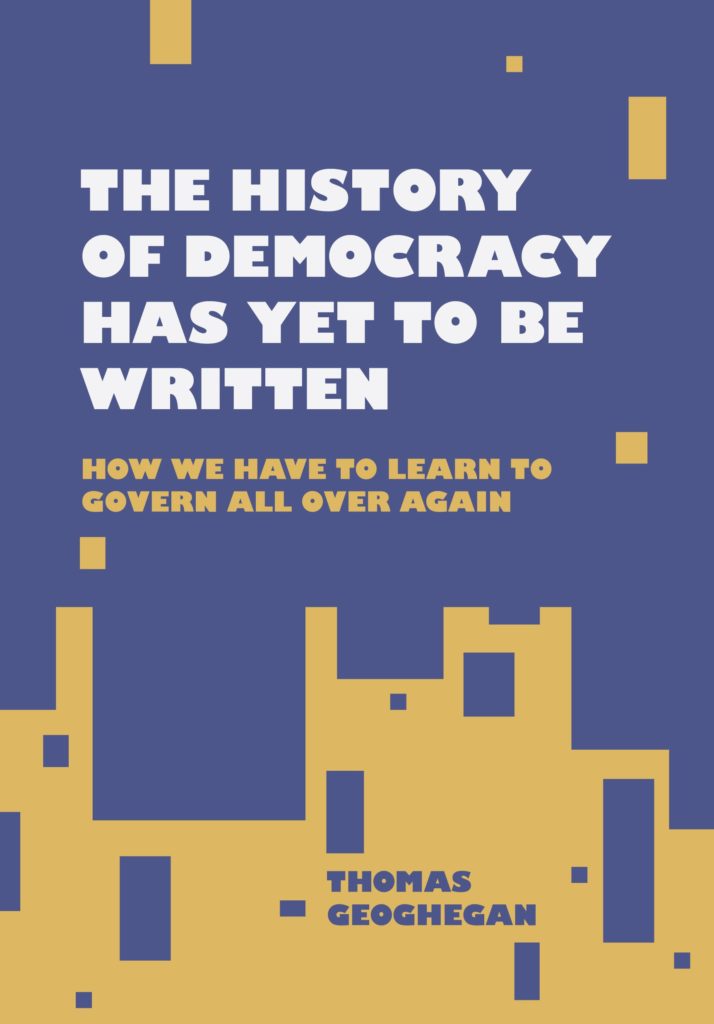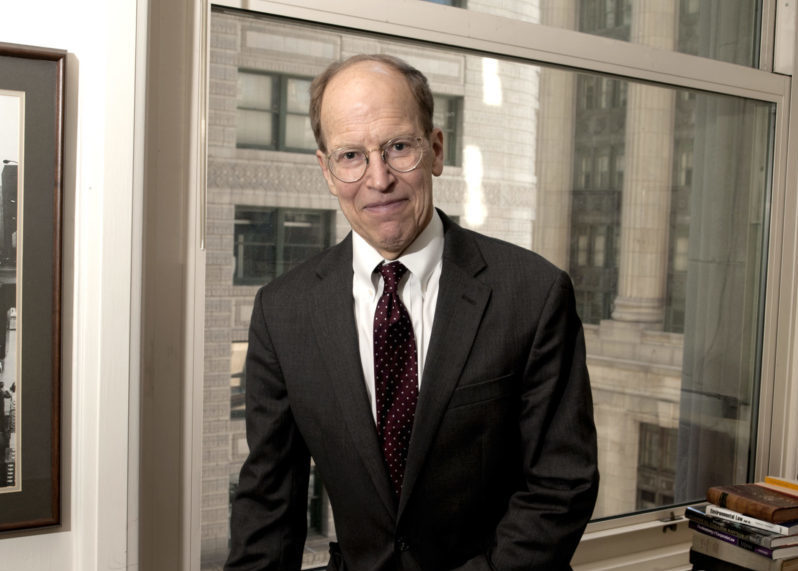In 2009, when Rahm Emanuel left Congress to become President Barack Obama’s chief of staff, Thomas Geoghegan decided to run in the special election for Emanuel’s seat representing the Northwest Side of Chicago. Geoghegan, a labor lawyer and public intellectual, had no political experience and little money, but he put himself through the campaign rituals of knocking on doors and cold calling donors.
Despite an endorsement from The Atlantic, Geoghegan received only 3,336 votes in the Democratic primary, finishing seventh in a field of 12. The seat was won by then-County Commissioner Mike Quigley. Geoghegan’s failed campaign and the lessons it taught him about politics, after writing about the subject from a distance for so many years, are the subject of his new book, The History of Democracy Has Yet to Be Written: How We Have to Learn to Govern All Over Again (Belt Publishing, $20). Geoghegan will throw a launch party at 6 p.m. on Sept. 27 at The Hideout, 1354 W. Wabansia Ave.
What did you learn from running for Congress in 2009?
I learned that [political consultant] Kitty Kurth was right when she told me I had absolutely no chance, that I should do it anyway, and I would never regret it. What partly prompted me to write up this story first, then go onto other topics about representative democracy, is my belief that so many of the books and tracts and articles I read about democracy fail to give the kind of personal, existential dimension of it. I wanted to give my own take on it, and all the lessons I had learned, things I wished I had done, what to expect if one tries this, and how it changes you — sometimes for the worse, but on the whole, by far, for the better.

How did actually being in politics change your understanding of it, and your understanding of democracy?
I used to feel heartbroken, sorry, for people who were the losing candidates on election night. Now I think, “They must be really happy that the whole damn thing is over.” Another thing that I found: As awful as the money is in politics — and it’s awful — it does force you to get out there and stand up for yourself and ask for yourself. If you aren’t able to put yourself out there and ask people to give you money, maybe you shouldn’t be running for office. The campaign funding system is a monstrosity, and I’m all against it, but it’s not a complete negative. It is demeaning, but it teaches you a certain amount of humility. It has a way of excluding people from office who don’t want to ask for money, and I have to say that I don’t want to do it ever again.
The winner of that race, Mike Quigley, won with 12,000 votes. You say that there’s something wrong with democracy when someone can win a congressional seat with 12,000 votes.
Representing 600,000 people, more or less for life? It’s not that there’s anything wrong with winning with 12,000 votes, but only 50,000 people voted. I don’t want to beat up on Mike Quigley, or question his legitimacy. What’s significant about that was here was the country’s red-hot political city, right after Obama was elected. We were in this jaw-dropping, frightening situation, with the [gross domestic product] falling like a rock. There was some question whether capitalism, much less the underlying legal system, was going to continue — and yet it was kind of a no-show election.
You think that there should be mandatory voting.
We have to pull people into the government of the country. We have to learn to govern ourselves. If we can’t do that, we’ll end up in this polarized society that we’re now in where 40 percent of the country isn’t voting. If everybody were to participate in the democratic process, some of the dysfunctions of the Constitution would go away.
You’re a lawyer in your day job, and you said one of the reasons that the courts are so prominent and so powerful is that the Constitution makes it difficult for things to be done legislatively.
The framers expected that Congress would be far and away the dominant branch, and it would crush the other two branches. So they divided the power between the House and the Senate. The problem is that they overdid it, and it’s gotten worse. Thanks to the filibuster, it’s even harder to get things through. Not just the filibuster, but the whole arrangement of having 50 states where 7 percent of the population can elect enough senators to block a bill.
Instead of the legislative branch encroaching on the executive and judicial branches, the problem has turned out to be just the reverse. The executive branch and the courts have encroached on the power of the legislature, because the legislature can’t act. The courts start filling in gaps and laws that normally the legislature would fill in.
One of your chapters is titled, “Abolish the Senate.” Why? Isn’t that a compromise that holds the country together?
I’m not really in favor of completely abolishing the Senate, but I’m in favor of abolishing a Senate that defies one person, one vote. That doesn’t represent the country; it creates two countries, not one. There’s the country that the Senate represents, where North Dakota is the same status as California, which is ridiculous, and then there’s the real country, where there are a lot of people living in California, and not a lot of people in North Dakota.
If everybody were to participate in the democratic process, some of the dysfunctions of the Constitution would go away.
The United States as it exists in real life is a much different country as it exists in the Constitution, and this disconnect is driving us crazy. We’re not a free people because, as a people, we’re not capable of making our decisions. We’re in this crazy fun house mirror of a country where North Dakota is equal to California and everything is being blocked all the time.
Why did the Democrats lose the white working class — especially to Trump — and how can they win it back?
They haven’t lost all of it. I have so many clients who are white working class that are hardcore Democrats. In a broader sense, it’s true that the Democrats have lost the white working class. People are reacting to the Democrats for many reasons. The one that I wanted to emphasize was this sense that the Enlightenment for which the Democrats stand — the knowledge economy, education, tolerance — is their worst enemy. It looks to be a guise for exploiting working people, who are not part of the knowledge economy, which is reserved for the educated elite, and the rest of the country can go pound sand.
That’s not the only reason. Race is a huge reason, but I would say this about race: If there was no race issue in this country, if one day we woke up and the white working class had no grudge against Blacks, Latinos or anybody else, we’d have the Black and Latino working class voting for Trump for the same reason that the white working class is voting against the Democrats: They sense the hierarchical privilege and their exclusion from the knowledge-based economy, and they resent the educated elite in this country.
So you’re never going to run for office again?
Oh, I’m too old to run for office. I wanted to explain in this book that while it was a nightmare and I’ll never do it again, you, the reader, should do it. You ought to get out there and run for office. It’ll be horrible, but you’ll never regret it. That’s the message of the book.



